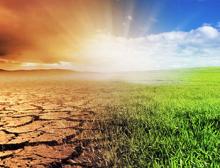Chapter 4 (pages 57-83) in open access book; see related resource: Invasive Species in Forests and Rangelands of the United States: A Comprehensive Science Synthesis for the United States Forest Sector
Mean surface temperatures have increased globally by ~0.7 °C per century since 1900 and 0.16 °C per decade since 1970. Most of this warming is believed to result from increases in atmospheric concentrations of greenhouse gases produced by human activity. These changes will affect invasive species in several ways. Furthermore, climate change may challenge the way we perceive and consider nonnative invasive species, as impacts to some will change and others will remain unaffected; other nonnative species are likely to become invasive; and native species are likely to shift their geographic ranges into novel habitats.
In order to manage invasive species under a changing climate, it is important to anticipate which species will spread to new habitats and when, and to understand how the characteristics of specific invaders may disrupt or have the potential to disrupt invaded ecosystems. Of utmost importance in containing the spread of invasive species, managers must have the ability to (1) predict which species will positively respond to climate change, (2) predict and detect sites likely to be invaded, and (3) deter incipient invasions before they are beyond control. We outline methods for developing the capability to predict and monitor invasive species in order to forecast their spread and increase their detection. Key findings and key research needs are included for each section.
Citation: Finch, Deborah M.; Butler, Jack L.; Runyon, Justin B.; Fettig, Christopher J.; Kilkenny, Francis F.; Jose, Shibu; Frankel, Susan J.; Cushman, Samuel A.; Cobb, Richard C.; Dukes, Jeffrey S.; Hicke, Jeffrey A.; Amelon, Sybill K. 2021. Effects of Climate Change on Invasive Species. In: Poland, Therese M.; Patel-Weynand, Toral; Finch, Deborah M.; Ford Miniat, Chelcy; Hayes, Deborah C.; Lopez, Vanessa M., eds. Invasive Species in Forests and Rangelands of the United States: A Comprehensive Science Synthesis for the United States Forest Sector. Heidelberg, Germany: Springer International Publishing: 57 - 84. Chapter 4.

